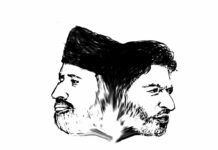Is the Spilit Spiral only way out?

Fresh Hurriyat splinter Chief and a veteran separatist Shabir Ahmed Shah while addressing a seminar proclaimed that there is no scope of unity with those who have, according to him, “lost faith in the struggle”. His obvious reference was a faction of the erstwhile separatist amalgam led by Mirwaiz Umer and its whole brigade of “moderates”.
In separatist ABCD ‘JK’ is a recent combination that has avowed, afresh, to put the horse back before the cart. And many of those pushed to the margins are joining this new ‘mainstream’. However, this new formation on the “resistance” map of Kashmir kind of raises many questions than it answers. Shah – famed prisoner of conscience – has been on the fore front of the campaign for reunification of Hurriyat Conference. He in fact served a term in jail for this “crime”. In 2008, attempt to reunify Hurriyat figured as one of the charges on his charge sheet. He with his colleagues Nayeem Ahmed Khan and Late Shiekh Aziz left no stone unturned to bring about unity between SAS Geelani and Mirwiaz led factions. Their attempts resulted in a short- lived silver lining in 2008 when a three point agreement was signed by Mirwiaz Umer and other leaders including Shabir Shah after a nearly seven hour long meeting with the leaders of Geelani led faction at the latter’s Haiderpora residence. The silver lining was lost soon in the darkness that has befallen the skies of Kashmir’s resistance.
Now, the same champions of ‘unity-cause’ are so disillusioned that after more than half a decade of futile attempts they decided to float a separate faction rather than merging with either of the already split factions.
In 2003 senior leaders like Geelani and Mohammad Ashraf Sahrai with many other colleagues decided separation to be the only way-out to salvage the spirit of the resistance and put the train back on tracks. The garlands and the brick-bats followed. Some opinion makers still allege factionalism as main cause of ‘‘weakening of the cause’’. Shah and many of his colleagues have been heard at many occasions making the same argument while pleading for unity. However, the creation of the new faction has exposed the bleakness of chances of any reconciliation in the separatist camp. Rather, it has enforced the idea of parting ways as the only way forward. Now Shah and other leaders of ‘JK’ are using same arguments, even the words sometimes are strikingly similar, that Geelani has used when asked about the separation.
For that matter Geelani, if asked, still maintains that if conditions are met unity can be achieved. The conditions most importantly include, revisiting 1993 constitution and no compromise on UN resolution/ tri partite, result oriented talks. Instead, the new faction has a hard stand expressed in harder words rejecting any possibility of re-union.
Differences between Mirwaiz faction and ‘JK’ are evident not only from the estranged relations but also are vividly reflected in the stands taken by the leaders of the two factions vis a vis larger Kashmir discourse and its various denominations. However, if looked at minutely Hurriyat JK does not look very different than Hurriyat G at least in what they say regarding many burning issues in Kashmir and regarding the issue itself. UN resolutions or meaningful tri-partite dialogue is a baseline of Shah led faction. The biggest difference, in public space, between say Hurriyat G and Hurriyat M is their respective stands on election process in the disputed region. For Hurriyat M it is not an issue at all and considers “the cause” immune to its effects; while as Hurriyat G considers elections under Indian constitution adverse for the movement and maintains that GoI has been conveniently using voter turnover as a number game to mislead the international opinion, hence advocate total boycott policy. JK faction agrees in principle with Geelani led faction and has already been advocating poll-boycott in 2014.
So a common mind, very naively, may dare to ask that why can’t Hurriyat JK think of some arrangement with Hurriyat G, if not completely merging in it? And why can’t some common terms be explored by the two groups instead of further split. The responsibility, I do not say, entirely and necessarily lie on the JK leaders to explore such options; Hurriyat G can also look within and remove, if at all there are, any obstacles that might be blocking the possibility of such an exploration.















